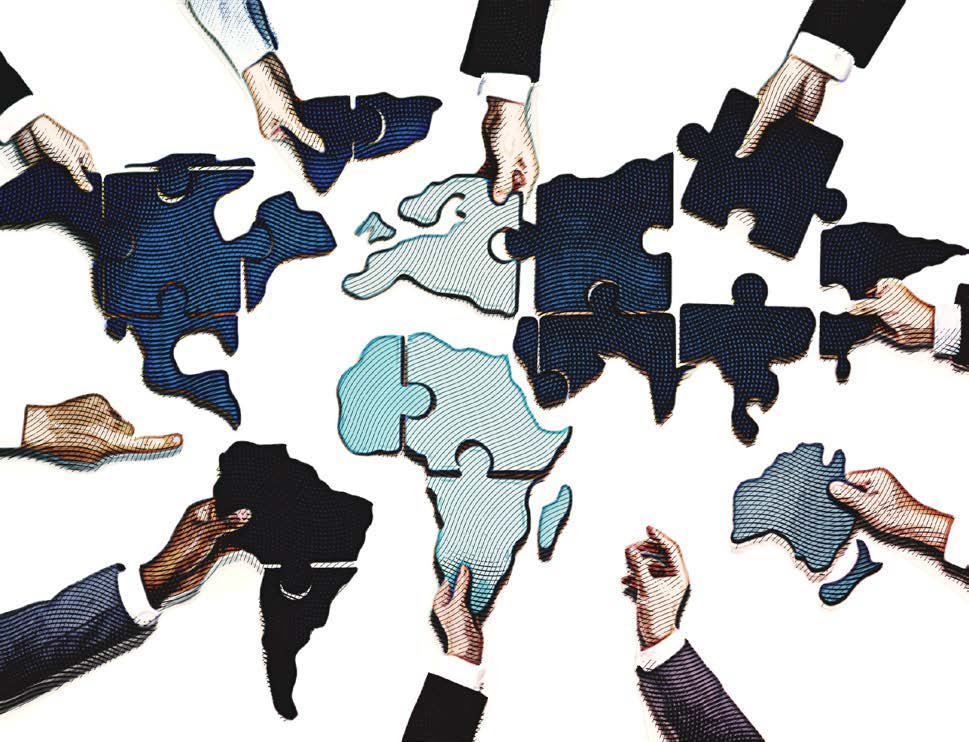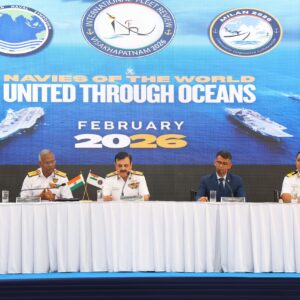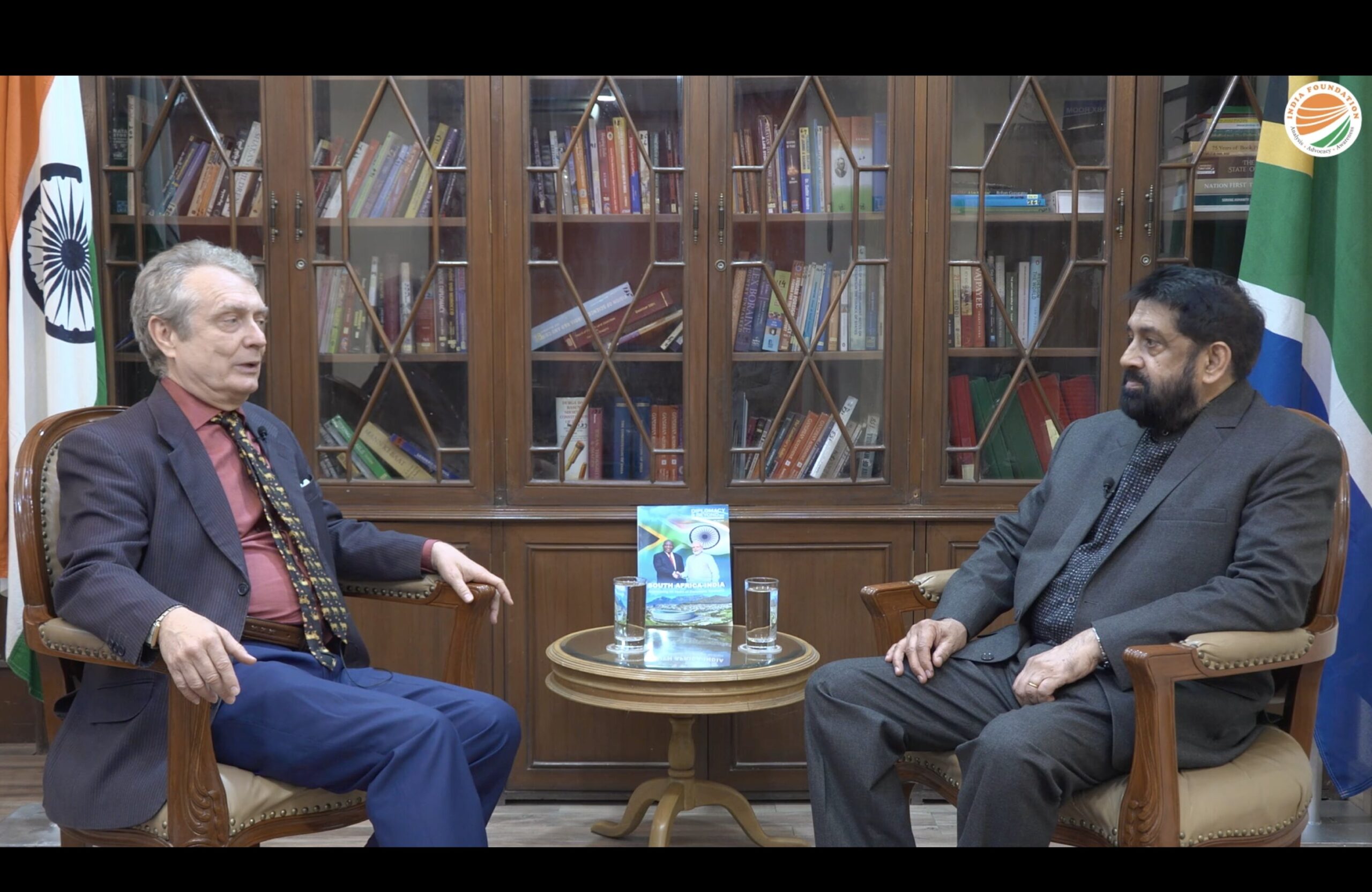Abstract:
The annual G20 Presidency of India comes in a year, which despite all the difficulties thrown by 2022, only promises to be worse. The IMF has noted that “2023 will feel like a recession”. The slowdown will be broad based, with countries accounting for a third of the global economy expected to contract this year or next[i].
The Covid pandemic for more than two years erasing health and education gains of more than a decade, the subsequent Chinese lockdown creating a global supply chain shock to manufacturing, the Russia—Ukraine war and the consequent fossil fuel led global energy crisis and the consequent evaporation of stamina to tackle the global climate agenda, add up to a long spell of bad news for this decade.
The reasons why the world is facing utmost challenge in tackling these overlapping crises is the failure of the multilateral order. Hardly any multilateral institution (MI) has escaped unscathed. At an institutional level this is the biggest casualty of this decade. That these institutions, created post the Second World War to nurture global opinion and therefore policies on a series of topics that concern the welfare of the world population, rising above often narrow national considerations have been rent asunder means the global order has to be built anew, in a climate of intense distrust among the nations.
This perspective offers the insight into why the role of G20 has become paramount. In a sense, the G20 is not a typical MI. The organisation does not have a permanent secretariat. It was created in the aftermath of the Asian crisis in 1999 but recognising its versatility it graduated to become the only heads of summit forum in 2008 in the wake of the Global Financial Meltdown, capable of taking swift and enforceable decisions.
Along with 19 nations and the European Union, the G20 high table also includes almost all the key multilateral institutions. The communique of the G20 has till now, never examined the state of health of these institutions. But in an unusual departure it will do so now, as India’s finance minister Nirmala Sitharaman has pointed out recently. She has said India will prioritise the strengthening of these multilateral institutions, a call that is most appropriate at this juncture.
Introduction:
It is an amazing coincidence that beginning with Indonesia, the annual G20 Presidency will remain with the global South for four years. India, which shall assume the Presidency in December 2022, will hand it over to South Africa in 2024. Brazil comes in thereafter in 2025. The continuity provides a great opportunity to redraft the role and the leadership of the MIs by a new set of nations, mainly from the global South.
In these four years, the foremost question the G20 will have to address is how to rebuild the MIs to effectively serve the new world order. There is similar breakdown and rebuilding taking place at another level, that of defence. The global security pacts of the 20th century are being upended by new ones like the Aukus and the Quad. “The formation of AUKUS…and its impact on the geopolitical environment and security architecture in the eastern Indo-Pacific region is likely to be significant”[ii]
The setting is therefore most appropriate to appreciate why a large-scale putsch of the order of the MIs, is in order (no pun). To understand why, a brief recital of the journey of these bodies, is necessary.
First of all, what do we mean by the universe of MI? These institutions were a response of the victorious nations to the devastation inflicted by the Second World War. They were meant to guide the gradual dismantling of the colonial world order built on empires to a new world order to be based on the voluntary comity of nations. That this transition should happen well, was the raison d’être of each MI. Yet, given that many of the nations were just infants, economically and politically, when they entered the post-colonial world, the leadership role of the MIs were largely concentrated among the leading Allied powers, led by the USA. It also created an interesting geography of the headquarters of these bodies, located exclusively in the Western European continent and the USA.
The foremost of them was the United Nations whose charter was initially signed by 50 nations including India, in 1945. Since then, the membership of the UN by countries and of its related bodies like the WHO, the UNESCO, UNICEF, FAO and UNHCR among others have exploded[iii]. The other set of charter organisations came out of the Bretton Woods conference of 1944, led by the IMF, the World Bank, the GATT and the continent wise development finance organisations including the ADB, the EBRD and the AfDB. While the alphabet soup expanded every decade since then, the most notable addition to the list has been that of WTO (a follow up to the GATT) in 1995 and the three Asia based financial institutions, the New Development Bank in 2014, the AIIB in 2016 and the ISA in 2018. For the past seventy-seven years since 1945, these MI had run on a governance structure straddling the global commonwealth of finance, disarmament, health, education, labour, laws of the seas and of air, to even culture and more. The key roles in the UN family was based on the voting rights of the nations in the Security Council, while in the economic MI, these were often based on preferential voting rights.
But in the face of the challenges thrown up by the third decade of the twenty-first century, the MIs are failing drastically short. This is quite different from several occasions in the 20th century when nations found the remit of the various MI inadequate. Those inadequacies were addressed not by calls to develop new institutions jettisoning the old but by coopting the old and the new institutions. For instance, the establishment of internet coordination platform, ICANN in 1998 filled an emerging gap in the development of the net. But it looped back with the UN. Sometimes, the UN itself promoted a new organisation. The most famous of them all, the Intergovernmental Panel on Climate Change came up in 1988 to coordinate global response to the warming planet.
In the current decade there is instead no call to develop such feedback loops but restructure the organisations, hook, nail and sinker. Why has this happened? It is because the governing structure of these MIs have fallen prey to intense hostility among the member nations, in an era of hardened politico-economic differences. The “continued success and relevance (of the UN) would be determined by its ability to adapt to the realities of today’s world, which is starkly different from what it was at the time of its creation more than 75 years ago,” notes the BRICS Joint Statement on Strengthening and Reforming the Multilateral System, issued last year[iv].
For instance, conventional wars like that of Russia—Ukraine have split the UN so effectively that it cannot even decide on sanctions. In other wars not occupying comparable media space like those in Yemen or Iran, the differences are almost equally stark. New flashpoints are meanwhile developing alarmingly like those in South China Sea, where only the gunpowder is missing in action.
Add to them the list of challenges like the Covid pandemic, an energy crisis brought on not by natural shortages but because of a war bereft of reasons, a global supply shock of commodities brought on by the breakdown of a globalised supply chain and a climate crisis that offers no easy solutions but inflicts an unfair cost on those who are most at risk. Nations stand ready to blame each other, for each of these crises, but most important, point fingers at the MI for perceived bias[v]. Their inability has not escaped attention. “We therefore must modernise our multilateral institutions, making them fit for purpose and better equipped to deal with the global and cross-generational challenges we face,” notes a joint article penned by Jacinda Ardern, Cyril Ramaphosa and Pedro Sánchez, the Prime Minister of New Zealand, President of South Africa, and Prime Minister of Spain, respectively[vi].
In the post-Second World War era, the MIs were conceived to address tough social and economic challenges but armed with a stable governance structure. In the intervening decades these organisations worked on a common belief that each of the global problems can be addressed through adequate technocratic responses. The stable Eurocentric governance structures offered a plausible assumption that this was possible.
With the breakdown of faith in the governing structure, the MIs can hardly offer any adequate response to the current global war-like situation among many members[vii]. Those war-like postures have been sharpened into acute political hostilities among the members in the governing bodies of the MIs “The clash between China and the U.S. at the just concluded World Health Assembly in May marks the end of the multilateralism of the past 70 years”[viii]. In such an environment hopes of dousing the multiple crisis are just not on.
It is this context which allows one to understand why Finance Minister Nirmala Sitharaman said, at a Brookings Institution event in the USA “You need new institutions, please do… From the lessons learned from how these [existing institutions] have become less effective, we need to make them more effective as well”. Her highly significant remarks were made in a conversation with economist Eswar Prasad on ‘India’s Economic Prospects and Role in the World Economy’[ix]. These are measured remarks but that Ms Sitharaman has made them and at an institution where those shall be heard loud and clear, are themselves an indication of how deep the malaise has spread.
Role of G20:
In these recondite circumstances, where does the G20 fit in? The transformation of this group to that of a heads of state in 2008 followed a recognition, that the Global Financial Meltdown was too much of a bewildering development in the global economy. There was a recognition that unless a meeting similar to that of the G7 was held to bring the leaders of more key economies across the table, to direct coordinated action, there shall be intense pain for the global economy. The 19 countries plus the European Union at the table, brought with them up to 80 percent of the world’s economic output, two-thirds of the global population and three quarters of the international trade.
The template of commonly directed actions significantly helped the world swim out of the Meltdown. The first meeting in November at Washington DC was so successful that it became an annual template. “On that occasion, the country’s leaders coordinated the global response to the impact of the financial crisis that occurred in the US at that time and agreed to hold a follow-up meeting”[x].
After a decade of relatively moderate pressures, the success of the model was again made clear in April 2020 when the G20 leaders assembled virtually to direct global action against the Covid pandemic.[xi] The meeting, coordinated by Saudi Arabia as the President “asked Finance Ministers and Central Bank Governors to develop an Action Plan in response to COVID-19”. This included sharing of the latest information and country experiences on COVID-19 containment measures, their implementation and subsequent removal to minimise negative spillover and second wave effects, including the risk of secondary waves of infection. That level of coordination among the members of the UN system would have taken more than a year to come up for signature.
Compared to any other global organisations, including the UN Security Council, it is this ability of the G20 to bring the top political heads of state of the world in one room, speaking with and listening to each other, that has set it apart. It is this avatar in which the G20 will be needed to be seen again in a highly polarised world. In this context, other than the sterling role played by it with respect to the cataclysmic events of 2008, one has to examine to what extent the body has been successful and where it has failed, since then.
One of its striking successes in recent years is that in the Italian presidency in 2021 (the G20 presidency usually runs from the previous December to November), the G20 agreed to put a floor under corporation tax rates of 15 percent. Since then, all multinational companies with turnover of USD 100 billion or more have begun to recalculate their tax liabilities, globally. The body has also notched up several successes in the field of setting standards, like global telecom rules, data interoperability, financial technology, a common agreed approach to address the climate emergency, and so on. Importantly, the G20 meetings offered the world leaders an opportunity to speak with each other in person. Once the Meltdown was sufficiently addressed, the early part of the second decade allowed for tensions to be lowered across the table, on a vast range of issues.
Yet even this environment of letting off steam has not held up. The G20 meetings now face an intractable challenge. In the Indonesian Presidency, till now it is unclear whether the US, Canada and the European countries will agree to even sign a joint communique, along with Russia, in November this year. This communique is not symbolic but gives direction to the respective member countries expressing their “commitments and vision for the future, drafted from the chosen recommendations and deliverables from ministerial meetings and other work streams”. Yet, at several ministerial working groups, even the preparatory work has got largely stalled. In the G20 framework, a large number of subject areas are threshed at ministerial levels by the member countries. The working groups of country officials create draft joint declarations on labour, energy, telecommunications, health, finance and even arcane topics like culture.
The Russia-Ukraine war has cleaved the G20 into two groups. Russia is a member of the G20, Ukraine is not. But never before has any of the member nations gone to war at this scale. The US invasions of Iraq and of Afghanistan, for plenty of reasons, do not count in the same league. The European and American nations are keen to include a reference to this war, in every possible forum, condemning Russia. It follows what they are doing domestically also. For instance, in all press communiques issued by the US department of treasury, secretary Janet Yellen has made an obligatory reference to the war, where she criticises the role of Russia and commiserates with Ukraine.
While all the Asian nations of G20 are on the same page in their criticism of Russia, they are also insistent that the right place for expressing any such opinion is the declaration of the heads of state, which will follow their meeting in November this year. As a result, when officials from the G20 nations have met this year as members of working group, more than the substantive issues, their dialogue have stalled. “Indonesia…is understood to be struggling to get all countries to arrive at a consensus on outcome documents. With tensions between the West and Russia intensifying, convening all members in the same room has been a challenge too”[xii].
The stakes involved:
Are there any competing global organisations that can offer a viable alternative? It does not seem so. Having wedged themselves into the war by supporting one of the combatants, neither the IMF, nor the World Bank and its associate organisations have shown the ability to bring all nations to a constructive dialogue. Two developments in this context are worth noting. First, there is hardly any doubt that the reconstruction efforts post the Russia-Ukraine war will be dominated by the heft of the membership of major nations across international organisations. India is hamstrung because she plays host to no major global institutions. Yet, as the fifth largest economy, she has a stake in the rules set by most of them.
Second, the weaponisation of the global financial system to target countries, most evidenced in the sanctions, price cap on sales of Russian crude and making the Swift system unavailable to transactions involving Russia and Iran, make it absolutely essential that India sits in positions of authority at the rule making bodies. As globalisation goes on retreat, participation in the multilateral organisations with strength is becoming more important for major nations.
One of the key organisations which could become a significant entity consequently is the Shanghai Cooperation Organisation (SCO). India is in an advantageous position here since it shall become the chairman of SCO in 2023. Analysts are already comparing the role of SCO with that of NATO in Europe[xiii].
“In the short term, the West has reasserted its dominance over the international system that it built in the aftermath of World War II. But it should expect a serious longer-term challenge from an intensification of the China-led effort to build an alternative system”, Mohamed A. El-Erian has written in his Project Syndicate column[xiv]. At stake shall also be dominant roles in organisations like the AIIB and the NDB.
At the IMF, India has already pitched for conflating the issue of Special Drawing Rights with enhanced voting rights. The dispute has led to stiff arguments among the member nations. India argues that just as nations which need more support from the IMF to recover from Covid by getting more SDR (which substitutes for scarce foreign exchange reserves for them), those nations which provide the support should also get larger voting rights.[xv]
Paradoxically, even as the MIs wilt, they shall be drawn into a vast agenda of reconstruction just as it happened post the Second World War. Estimates say that Ukraine itself shall need a global support of a massive USD 349 billion as per the World Bank, and there are going to be other centres of destruction[xvi]. The MIs shall be asked to estimate the scale of the disasters and prepare a laundry list. As Sitharaman noted, the multilateral institutions exist but problems remain and solutions are not coming through them.
But to get the whole set up of organisations ready to take on their renewed mantle, the G20 has to provide the political leadership in the governance of each of them. It remains the only organisation which has the persuasive power to make peace and reconstruction happen.
Author Brief Bio: Subhomoy Bhattacharjee is Consulting Editor for the Business Standard Newspaper and Senior Adjunct Fellow, Research and Information System for Developing Countries (RIS), New Delhi.
References:
[i]WEO Press Briefing Annual Meetings 2022, October 11, 2022
https://www.imf.org/en/News/Articles/2022/10/12/tr101122-weo-transcript
[ii] AUKUS and the Eastern Indo-Pacific’s Evolving Security Architecture, GIRISH LUTHRA;
[iii] For a list, see here https://www.ungm.org/Shared/KnowledgeCenter/Pages/VBS_UNSystem
[iv] BRICS Joint Statement on Strengthening and Reforming the Multilateral System,June 01, 2021
[v] Xenophobia, prejudice, and blame in pandemic times; Alexandra R White https://www.thelancet.com/journals/lancet/article/PIIS0140-6736(22)00197-0/fulltext
[vi] https://www.livemint.com/opinion/online-views/let-us-revitalize-multilateralism-the-future-of-the-world-is-at-stake-11633279934717.html ©2021/Project Syndicate
[vii] 10 Conflicts to worry about in 2022: Mid-year update https://acleddata.com/10-conflicts-to-worry-about-in-2022/mid-year-update/
[viii] Multilateralism in the new cold war; Mukul Sanwal. The Hindu
https://www.thehindu.com/opinion/op-ed/multilateralism-in-the-new-cold-war/article31734107.ece
[ix] https://www.hindustantimes.com/business/g20-has-a-great-potential-to-work-towards-global-good-sitharaman-in-us-101665560764915.html
[x] https://www.g20.org/about-the-g20/#about
[xi] Communiqué—Virtual meeting of the G20 finance ministers and central bank governors
Riyadh, Saudi Arabia, April 15, 2020;
http://www.g20.utoronto.ca/2020/2020-g20-finance-0415.html
[xii] With an eye on G20, Sitharaman steps up engagements in Washington DC, Hindustan Times, Oct 14, 2022
[xiii] Rogue NATO: The new face of the Shanghai Cooperation Organisation; © European Council on Foreign Relations 2022
https://ecfr.eu/article/rogue-nato-the-new-face-of-the-shanghai-cooperation-organisation/
[xiv]The Ukraine War’s Multifaceted Economic Fallout; Mar 7, 2022, Mohamed A.EL-Erian https://www.project-syndicate.org/commentary/economic-policy-response-to-ukraine-war-by-mohamed-a-el-erian-2022-03
[xv] Bhattacharjee, Subhomoy. “India May Not Get to Play a Major Role in Reconstruction of Ukraine.” Rediff. Rediff.com, March 16, 2022. https://www.rediff.com/money/report/india-may-not-get-to-play-a-major-role-in-reconstruction-of-ukraine/20220316.htm.
[xvi] Ukraine Recovery and Reconstruction Needs Estimated $349 Billion





